| Srl | Item |
| 1 |
ID:
168591
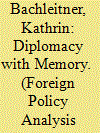

|
|
|
|
|
| Summary/Abstract |
This article suggests that there exists an alternative form of international political behavior between countries who share a common traumatic past: diplomacy with memory. Diplomacy with memory manifests itself as an official, diplomatic team performance that aims at conveying a certain historic image for the purpose of achieving rational aims on the international stage. In a first step, a theoretical and empirical framework is developed that highlights diplomacy with memory as a strategic diplomatic action that does not conform with mainstream IR models of state behavior. In a second step, the new theoretical model is tested on two selected postconflict scenarios: The bilateral negotiations between West Germany and Israel, and between Austria and Israel about eventual reparation payments to the Jewish state in the early 1950s. Extracting the core elements of the diplomacy with memory from these historical examples, this paper suggests amending the toolkit of traditional diplomatic strategies with memory in order to better explain state behavior in other postconflict situations as they emerge.
|
|
|
|
|
|
|
|
|
|
|
|
|
|
|
|
| 2 |
ID:
193480
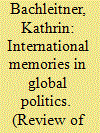

|
|
|
|
|
| Summary/Abstract |
This paper is interested in the role and function of memories in United Nations Security Council debates about humanitarian intervention. It posits that historical experiences and their lessons serve as interpretative devices for the abstract international norms and principles under discussion. The paper speaks of ‘international memories’ where the meaning and lessons derived from the past coalesce among a group of states. Empirically, its case study explores how the memories of totalitarianism/fascism and colonialism were employed in United Nations (UN) representatives’ verbal pleas to intervene in Libya and Syria after the Arab Spring. It finds that those who supported or opposed humanitarian intervention held different interpretations of these memories and their lessons. In each case, however, memories provided essential normative guidance to states when it came to implementing the abstract international principles, norms, and rights that underlie humanitarian intervention.
|
|
|
|
|
|
|
|
|
|
|
|
|
|
|
|
| 3 |
ID:
184040
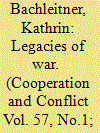

|
|
|
|
|
| Summary/Abstract |
This article is interested in the formation of war legacies and how they interact with social identities. It suggests a bottom-up approach towards examining the societal processes in which individuals create a legacy of war. It posits that through their narratives of conflict, by remembering what happened to them as a group, they mould the meaning and boundaries of how the group will be membered post-conflict. The validity of the theorised link between war memory and group membership is then tested in the case of Syria. In 200 interviews, Syrians provided their narratives of the conflict and their vision of a future Syrian state and society. The findings show that most respondents’ narratives follow a civic rationale, forming a society around civil rights and political ideas rather than around ethnic/sectarian divides. With this, the article contributes a new route for international relations scholars to understand the formation of war legacies through individuals’ narratives of conflict and explains their effects on ties of group belonging while also offering a glimpse into the Syrian ‘we’ amid the ongoing war in Syria.
|
|
|
|
|
|
|
|
|
|
|
|
|
|
|
|
| 4 |
ID:
189982
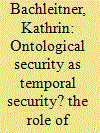

|
|
|
|
|
| Summary/Abstract |
This article explores the link between collective memory and state behaviour in international relations. In that regard, it develops a new concept entitled ‘temporal security’. Building on the existing ontological security literature, it extends a temporal understanding to its underlying identity concept. Countries are now assumed to be temporal-security seekers vis-a-vis a ‘significant historical other’ from their past. Decision makers thus enter into a self-reflective conversation with their country’s ‘collective memory’ when choosing courses of action. Contrasted with existing physical-security and ontological security explanations for state behaviour, the explanatory potential of the temporal-security approach is in a second step illustrated by the empirical case of West Germany and Austria, two former Nazi perpetrator states, and their respective assignments of support during conflict in the Middle East. Through a comparative, qualitative discourse analysis of historical documents during the Six-Day War of 1967 and the Yom Kippur War and oil crisis of 1973, the empirical study finds that West Germany and Austria adopted different courses of action in their international politics, because they looked to Nazi Germany as their significant historical other.
|
|
|
|
|
|
|
|
|
|
|
|
|
|
|
|
| 5 |
ID:
191602
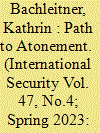

|
|
|
|
|
| Summary/Abstract |
Atonement is a state practice that comprises an official political apology and the offer of reparation payments to former victims of mass atrocities, war crimes, and human rights abuses. Despite being considered the moral and right thing to do, atonement has occurred only once at the state level: between West Germany and Israel in 1952. Whereas existing explanations view the West German pathway after the Holocaust as either an ethical choice or a domestic policy induced by U.S. pressure, atonement can also be a political decision. Politicians may give official apologies and pay reparations because such practices promise tangible political benefits. An investigation of the West German–Israeli case and a comparison with two non-atoning perpetrators of World War II, Austria and Japan, illustrate the plausibility of these claims. Atonement emerged as a bilateral strategy between West Germany and Israel because it represented a politically expedient option for both countries. This finding offers insights into when politicians may pursue atonement in other cases and points to a potential avenue toward long-term international stability and durable peace.
|
|
|
|
|
|
|
|
|
|
|
|
|
|
|
|